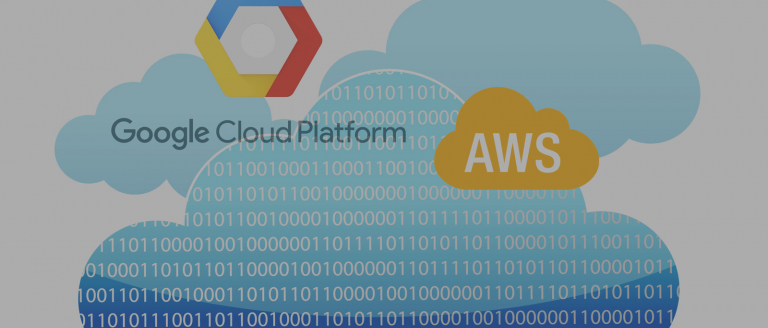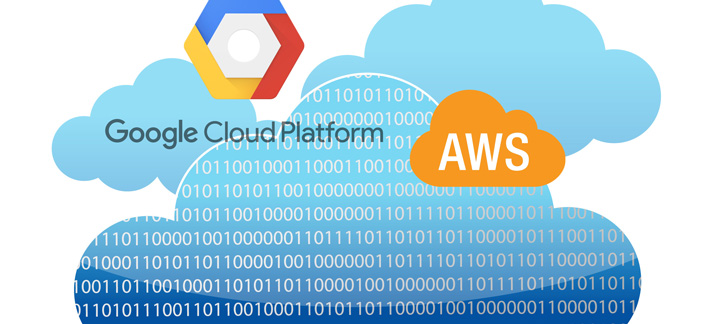Choosing the right hosting service for your business website or application can play an important role in the cost, scalability, and stability of your digital product. The introduction of hosting services on the cloud has produced a lot of innovation and changes in hosting services. Whether you choose Google Cloud, AWS, or another hosting service, understanding the pros and cons for each of your options is essential before making a decision that can impact your business, its structure, and how you provide services to visitors and potential customers.
Why the cloud
Using the Cloud for your future business endeavors is one of the most common solutions for both start-ups and multi-million dollar companies today. Hosting on the Cloud provides maximum up-time, performance, and scalability. If properly implemented, the Cloud can save you immense amounts of both cost and development time when compared to traditional hosting services. While there are many leaders in the space, including Google, Amazon, Digital Ocean, RackSpace, and Microsoft; Google Cloud Services (GCE) and Amazone Web Services (AWS) have stepped to the forefront as the main competitors in the Cloud due to their expanded networks. Selecting the right cloud service can be complicated, so we are going to focus on the two most important difference most businesses are concerned with: cost and uptime.
Cost
Cloud pricing can be complicated. While service providers have calculators to help you determine your monthly costs, there are a lot of variables to play with. Additionally, some service providers get you with hidden fees and obligations.
Both Google and Amazon have the benefit of offering various platform sizes with add-ons for enhancements like additional storage or processor upgrades. With AWS, you are required to add provisioned IOPS for various databases, as typically EBS IO are not as reliable on their own. Adding a local SSD ranges in price but begins at $675 for 800GB + 4CPU + 30GB. While this may seem off-putting, the package is always inclusive and includes everything you require to get up and running. Even if you do not require "Premium Support", there is a 10% surcharge for the service, which is mandatory with AWS. If you have been subjected to regulations, there is another 10% added to your bill for dedicated server instances and dedicated hosting, which is often required for small to large business operations.
If you choose to work with GCE, you not only enjoy the base cost and storage coverage for the price, but also dependable services and "out of the box" remote SSD volumes. If you require additional space, the cost of local SSD is $82 per 375 GB attached regardless of the instance of your choosing. Also in addition, customers may also enjoy an automatic discount for "sustained" usage, which can range approximately at least 30% over for instances that you have running 24 hours and 7 days a week. To offer even more savings, GCE also offers inferred instances, that is combining multiple instances in the same zone into a single instance for billing.
In general we have found GCE's pricing to be cheaper and more straight-forward to work with.
Network, speed, & uptime
When it comes to choosing a Cloud host, the data center locations are very important to review, especially if you are not using a Content Deliver Network (CDN). Depending on your business, it may be smart to select a Cloud service with the closest data center to your main target of users. Amazon's network is substantial, and while very competitive in the US beats out GCE in Europe and Asia.

But be careful, deploying your instance to a different location will come at a different rate. The US and Europe are the cheapest locations (in that order). Both providers have fast networks, and depending on your setup one might win out over the other. In our research we found that Google was faster for smaller size instances while Amazon snuck ahead when comparing larger setups. However, performance does come at a cost. If price is no concern than AWS will beat when comparing raw performance data, but if you take into account the value of the performance then Google will win every time. Finally, all of the cloud services offer the ability for load balancing and redudant fallback servers. But when comparing network uptime, Google was recognized to have the highest availability of any cloud over the course of 2016.
The more you know about various cloud services online today, the easier it is to choose a solution that works for your business based on your needs--whether you require additional support, speed, and a better interface for your company or future ventures. Reviewing various cloud networks prior to making your decision is a way for you to truly determine the best solution for the future growth of your business.

